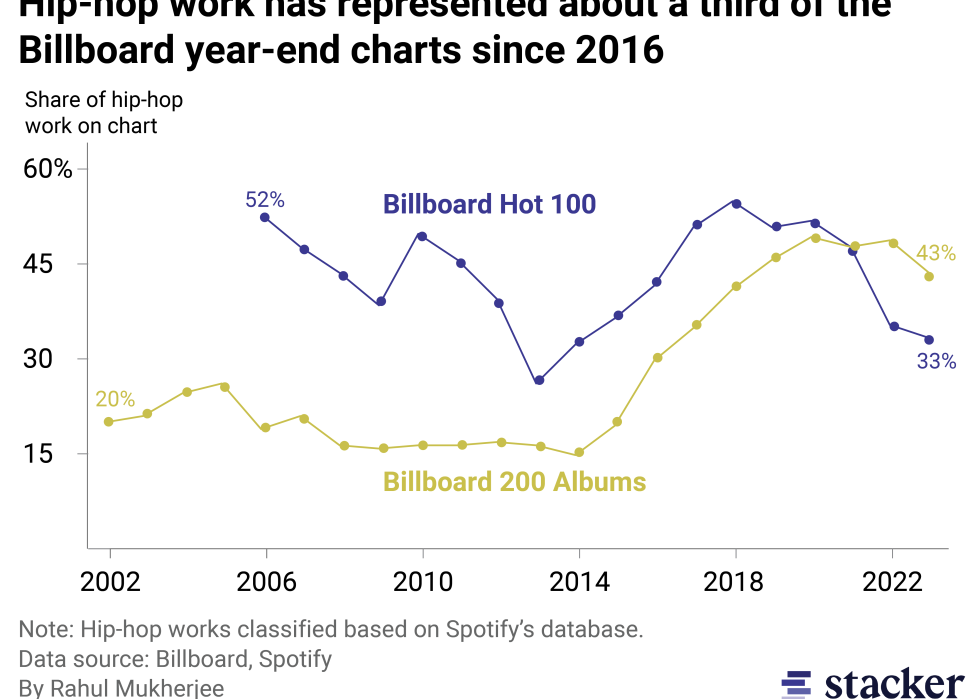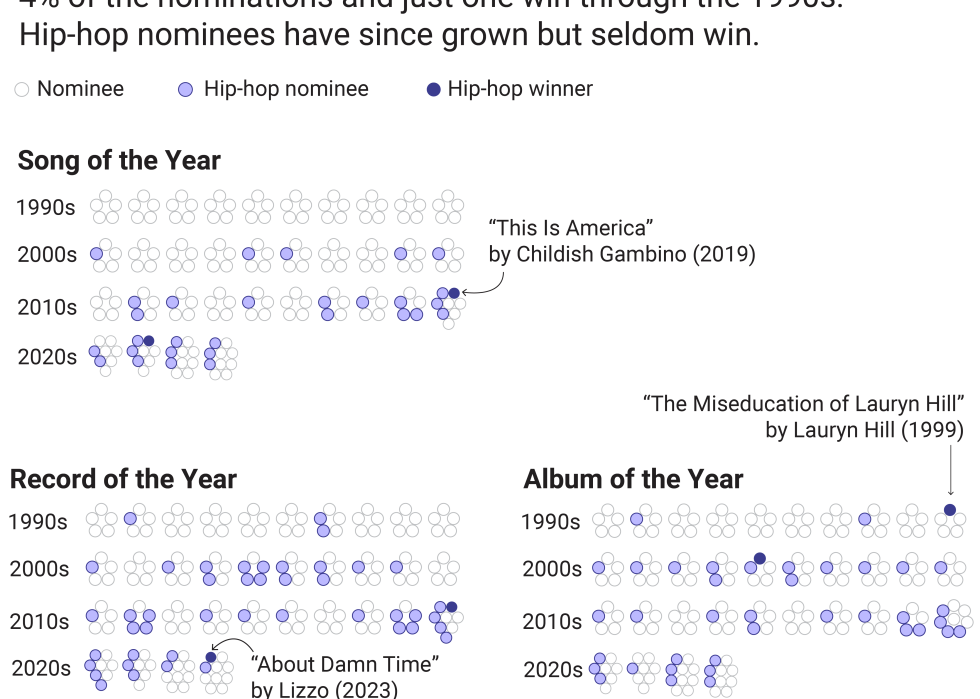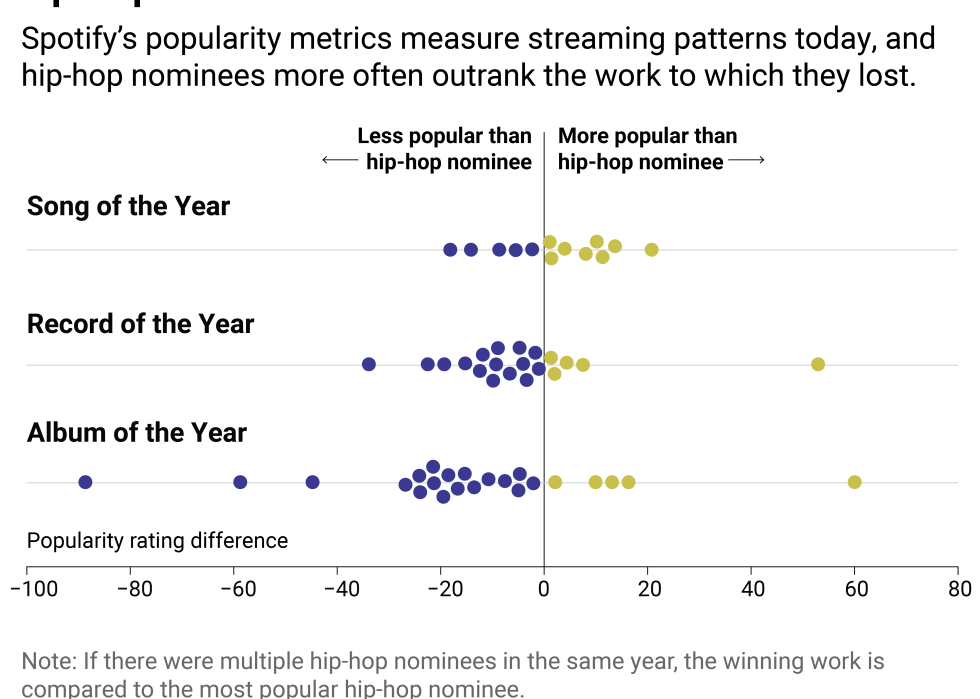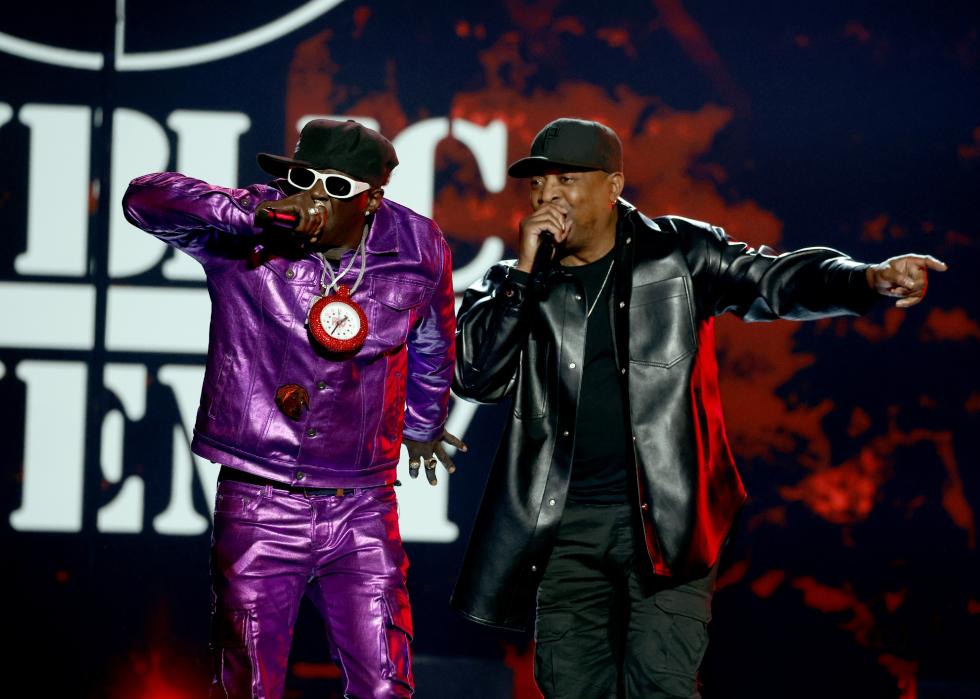Are the Grammys biased against hip-hop and rap? Here's what the numbers say.

The number of hip-hop songs and albums on Billboard's year-end charts has increased since 2002 and 2006 for the 200 Albums and Hot 100 Songs charts, respectively. These two years represent the earliest available data on Billboard's website. Hip-hop albums have steadily increased in popularity, comprising almost half (48%) of the Billboard 200 in 2022 and settling slightly lower (43%) in 2023. Seven of the #1 albums since 2002 have been hip-hop, including Kendrick Lamar's "Damn." and 50 Cent's "Get Rich or Die Tryin'." In other words, once every three years, a hip-hop album tops the Billboard 200.
Since 2006, hip-hop songs have represented a quarter to as much as half of the Hot 100 Billboard songs at the end of each year, though its popularity has waxed and waned. Five of the #1 songs since 2006 include the Black Eyed Peas' "Boom Boom Pow" or Drake's "God's Plan." Once about every four years, a hip-hop song reached #1 on the Billboard Hot 100.
Billboard's figures align with Spotify's findings that nearly a quarter of streams are of hip-hop artists like Drake, Nicki Minaj, and Metro Boomin. Hip-hop is a global behemoth, and it's likely to grow even more since its audience tends toward the younger age groups. Millennials and Gen Zers comprise about 3 in 5 listeners, according to Nielsen.

Despite the genre being included in 1989, no hip-hop work was nominated for any major Grammy categories until 1991, when MC Hammer was nominated for Record of the Year and Album of the Year. A hip-hop nominee wasn't announced for Song of the Year until the 2000 Grammys with TLC's "Unpretty." The next time hip-hop was represented in the category was Eminem's "Lose Yourself," which was nominated at the 2004 Grammys.
On average, hip-hop nominations appeared in nearly half of the years (46%) for Song of the Year since the Grammys introduced that first rap category. It was the lowest frequency of the three big categories Stacker analyzed. Hip-hop fared better in the Album of the Year and Record of the Year categories, appearing more often since 1989, 71% and 63%, respectively. The first hip-hop win in any of the three major categories wasn't until Lauryn Hill's Album of the Year win for "The Miseducation of Lauryn Hill" in 1999.
When one considers data from the 2020s, Stacker found the Recording Academy consistently underrepresented hip-hop in the three major categories. Hip-hop occupied 42% of the Hot 100 in the last four years, compared with 32% for Song of the Year and 31% of the time for Record of the Year.
For albums, the gap is about twice as much. From 2020 to 2023, hip-hop appeared on the Billboard 200 almost half the time (47%), but the Grammys has only ever nominated hip-hop albums 28% of the time—a 19% gap.
There have only been two hip-hop winners for each big category since 1989, and Album of the Year has not seen a hip-hop winner since OutKast's "Speakerboxxx/The Love Below" in 2004. The Record of the Year winners are more recent, with Childish Gambino's "This is America" and Lizzo's "About Damn Time" claiming trophies in 2019 and 2023, respectively. Childish Gambino also won Song of the Year in 2019, and H.E.R.'s "I Can't Breathe" followed three years later.

The Grammys aren't a great indicator of success when looking at the longevity of winners' popularity. A hip-hop nominee that lost in a major category is twice as likely to become even more popular as its Grammy-winning competitor, based on Spotify's Popularity Index, which mostly measures how often and how recently a song has been streamed.
The Album of the Year is the most egregious example, with 18 of the 23 non-hip-hop winners dropping in popularity to hip-hop work. Kanye West has the most albums (four) that lost at the Grammys but have since surpassed their competitors. In 2005, West's "The College Dropout" lost to Ray Charles' "Genius Loves Company," but it's considered one of the best debut albums and has become a pillar of hip-hop music. Its two successors, "Late Registration" and "Graduation," also surpassed their winners — U2's "How to Dismantle an Atomic Bomb" and Herbie Hancock's "River: The Joni Letters" — in 2006 and 2008, respectively.
Eminem has lost three times: in 2001, with "The Marshall Mathers LP" falling to Steely Dan's "Two Against Nature"; in 2003, with "The Eminem Show" losing to Norah Jones' "Come Away with Me"; and in 2011, with "Recovery" being passed over for Arcade Fire's "The Suburbs." Eminem is a complicated figure in the industry: He's a preeminent hip-hop artist and his third album, "The Marshall Mathers LP," is considered a cornerstone of hip-hop, influencing the next generation of rap artists. That said, his music has also been accused of being homophobic and misogynistic. "Recovery," Eminem's first album after getting sober, also provided a turning point for his personal life.

When benchmarked to hip-hop's performance on the Billboard charts and Spotify, the Grammys lag behind. But the awards show wasn't created to measure saleability or popularity. According to its site, the Recording Academy sets out to "recognize excellence," which can indeed be a very subjective standard.
Given the controversy that it courts, however, the Recording Academy has made steps to improve hip-hop representation. After criticism and #BlackLivesMatter protests, in 2021, the governing board dropped the step of asking anonymous experts to whittle down nominations into final nominees, which some artists have said causes career-defining decisions to be made without accountability.
The Academy has also invited many historic artists to perform, most recently for hip-hop's 50th anniversary in 2023. The Grammy celebration featured about two dozen songs, including showcases by pioneering acts like Grandmaster Flash and the Furious Five to contemporary artists like Lil Uzi Vert and GloRilla. According to the Recording Academy, the extravaganza lasted almost 15 minutes, the longest segment on any topic in Grammy history. It also produced a two-hour live concert special that aired in December 2023.
The Academy also expanded the voting pool in 2022, giving more space for "underrepresented communities." While not yet a perfect solution, the organization hopes it is a step in the right direction. "The membership has really evolved over the last two or three years," Recording Academy CEO Harvey Mason Jr. told Billboard after the 2024 Grammy nominees were announced. "So, I think the outcomes in those types of music is going to continue to change and evolve."
While hip-hop's place in Grammy history is under close scrutiny, this increased attention by the Recording Academy may only be a short-lived success. For the 2024 awards, there are only four hip-hop nominees in the three major categories. The number hasn't been that low since 2017, when there were only three hip-hop nominees.
Data editing by Emma Rubin. Story editing by Carren Jao. Copy editing by Paris Close. Photo selection by Clarese Moller.
